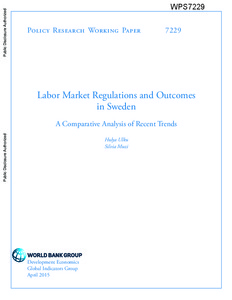Labor market regulations and outcomes in Sweden: a comparative analysis of recent trends

World Bank - Washington, DC
2015
40 p.
economic recession ; labour market ; labour market segmentation ; regulation
Policy Research Working Paper
7229
Labour market
English
Bibliogr.
"This paper analyzes recent trends in Swedens labor market regulations in relation to comparator economies and examines the relationship between labor market regulations and outcomes. The paper finds that the Swedish labor market responded more rapidly to the recent global financial crisis than the majority of the European Union economies, which helped Sweden to recover quickly. Swedens hiring regulations are more flexible than those of many comparator economies, however, fixed-term contracts of short duration might have adverse consequences for the economy. In addition, Swedens regulations on work during the weekly holidays and mandatory paid annual leave are stricter than those of the majority of comparator economies. Moreover, among the economies of the Organisation for Economic Co-operation and Development, Sweden has one of the largest differences in employment protection between permanent and temporary employees, which could lead to a segmented labor market, where insiders enjoy high job security and outsiders are largely marginalized. This could be cause for concern, given that Sweden has a higher share of involuntary temporary workers among youth and involuntary part-time workers than both the Nordic and European Union averages. While protecting employees is important, excessive protection, particularly if it differs across different types of employment contracts, has been shown to have adverse effects on welfare and economic performance."
Digital
The ETUI is co-funded by the European Union. Views and opinions expressed are however those of the author(s) only and do not necessarily reflect those of the European Union or the ETUI.